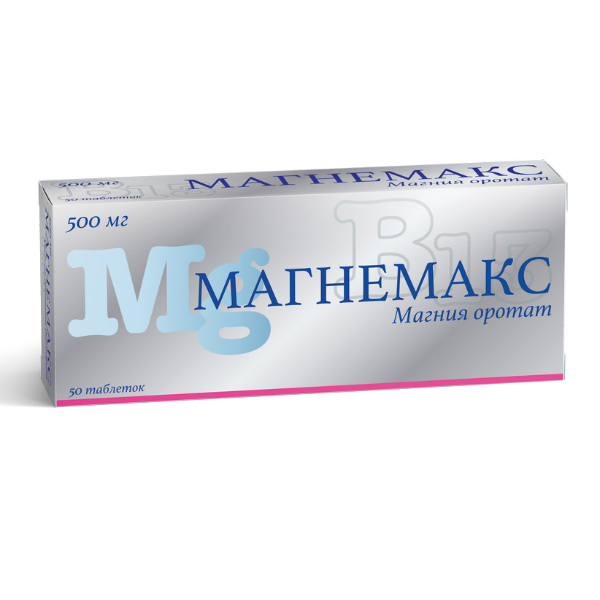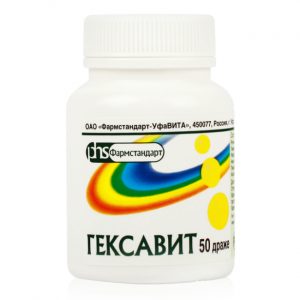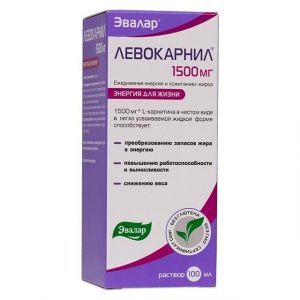Description
Release form
Tablets.
Pharmacological action
The drug is magnesium.
Magnesium is an essential microelement involved in the implementation of more than 300 enzymatic reactions, regulation of cell permeability and neuromuscular excitability.
is required to provide many energy processes, participates in the exchange of proteins, fats, carbohydrates and nucleic acids.
Magnesium has a curariform effect on the ending of cholinergic neurons, with a decrease in the release of acetylcholine.
Magnesium and calcium interact in the body partially synergistically: however, with competitive inhibition of calcium, magnesium can also affect binding sites as a physiological calcium antagonist.
Indications
Established magnesium deficiency, isolated or associated with other deficient conditions, accompanied by symptoms such as: – increased fatigue
– increased irritability
– tingling sensation in the muscles.
– minor sleep disturbances
– gastrointestinal cramps
– pain and muscle cramps
If after a month of treatment there is no decrease in these symptoms, continued treatment is not practical.
Contraindications
– hypersensitivity to the components of the drug
– urolithiasis
– impaired renal function
– predisposition to the formation of calcium-magnesium-ammonium-phosphate stones
– cirrhosis of the liver with ascites 18 years old – childhood srd.
The drug contains lactose, therefore, it should not be used in patients with lactose intolerance, lactase deficiency or glucose-galactose malabsorption.
Special instructions
Solikva SoloStar ® is contraindicated in patients with type 1 diabetes mellitus or for the treatment of ketoacidosis.
Translation from the GLP-1 receptor agonist to the Solikva SoloStar ® preparation has not been studied.
The simultaneous use of Solikva SoloStar ® with dipeptidyl peptidase IV inhibitors, has not been studied. glucose and galactose malabsorption syndrome and lactase deficiency.
Effect on the ability to drive vehicles and mechanisms
The drug does not affect the ability to drive vehicles, mechanisms and engage in other activities that require an increased concentration of attention and speed of psychomotor reactions.
Ingredients
1 tablet contains:
active ingredient:
magnesium orotate dihydrate 500 mg
excipients:
lactose monohydrate,
corn starch,
microcrystalline, crystalline crystalline, srdl crystalline, crystalline ,
sodium cyclamate,
talc,
magnesium stearate.
Dosage and administration
Inside, before meals, with a small amount of liquid.
Assign 2 tablets 3 times / day for 7 days, then 1 tablet 2-3 times daily.
Duration of treatment – 4 weeks.
Side effects of
From the gastrointestinal tract: unstable stool and diarrhea, which usually go away on their own with a lower dose.
On the part of the immune system: allergic reactions.
Drug interaction
While taking magnesium-containing drugs with iron preparations, sodium fluoride and tetracyclines may decrease the absorption of the latter.
In addition, aminoquinolines, quinidine, penicillamine should not be administered simultaneously with magnesium preparations. Therefore, you should take these drugs at intervals of 2-3 hours.
Oral contraceptives, diuretics, muscle relaxants, corticosteroids, insulin, reduce the effect of the drug. Magnesium should be used with caution against the background of the use of magnesium-containing drugs, such as antacids or laxatives, or potassium-sparing diuretics or drugs containing calcium.
With simultaneous use with preparations containing aluminum, the absorption of aluminum in the body may be increased.
Magnesium should be used with caution when used simultaneously with digitalis preparations, since the simultaneous use can disrupt the absorption of digitalis preparations.
Some antibiotics (aminoglycosides), cisplatin and cyclosporin A can lead to increased excretion of magnesium.
Some diuretics (thiazides and furosemide), cetuximab and erlotinib, proton pump inhibitors (omeprazole and pantoprazole), foscarnet, pentamidine, rapamycin and amphotericin B can cause magnesium deficiency, and, thus, reduce the effect of the drug.
Overdose of
In normal renal function, ingestion of magnesium does not cause toxic reactions.
Magnesium poisoning can develop in renal failure.
Toxic effects mainly depend on the concentration of magnesium in serum.
Symptoms: decreased blood pressure, nausea, vomiting, depression, slowing reflexes, respiratory depression, coma, cardiac arrest, anuric syndrome.
Treatment: rehydration, forced diuresis. In renal failure, hemodialysis or peritoneal dialysis is necessary.
Storage conditions
The drug should be stored out of the reach of children at a temperature not exceeding 25 ° C.
The Expiration of
is 3 years.
Deystvuyuschee substances
magnesium orotate
Form of Treatment
tablets



